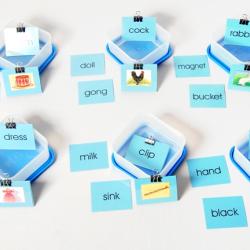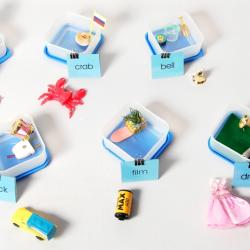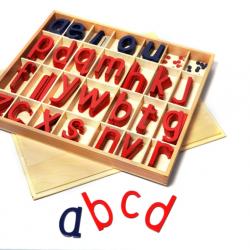Reading and writing are quite distinct from a knowledge of the letters of the alphabet. They really come into existence when a word rather than a graphic symbol becomes a fixed element.
Dr. Maria Montessori The Discovery of the Child
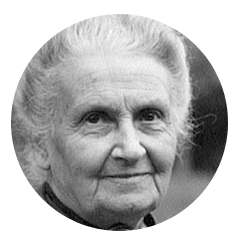
Language Development in Montessori
Language is not inborn but learned. Language is an important expression and an organized system of words spoken or written to communicate. It is a human tendency to communicate and language facilitates that tendency through the use of symbols and words. Languages are individual systems of symbols and words with the accepted meaning used by different groups of people to communicate among each other. Language helps to communicate ideas and feelings by the use of conventionalized sounds and signs, therefore resulting in a medium of communication. The ability to use language is the main factor that distinguishes humans from the rest of the animal kingdom.
The medium to communicate through human language has evolved- from pictograms or pictures and drawings to ideograms and symbols; then to words. Words involve letters and vowels. A symbol represented one sound and an alphabet was created, thus the alphabets came through that we use today. Evolution of language is similar to that of human's, unneeded words are dropped and new words emerge and come into use. Language evolves with intelligence and continues to do so as the powers that come with language are revealed to be a lot more beneficial than imagined.
Children learn language right from the time they start observing with their senses. Language is absorbed as the child grows up at home and school and that absorption takes place during almost all the time, particularly at home and school during interaction, while listening and watching others communicate. There is already enough constructed language in mind of a child before entering the classroom that the spoken language is consolidated with the exploration of written form of language. A child needs to be spoken to and listened to in order to help in the process of thinking as language is an integral and intricate involvement factor of a child's mind. Language has risen with the collective intelligence of correct articulation, enunciation and punctuation. Children need a broad exposure to language and a need to experience different modes of language to hear and tell stories as by age six, they will have reached third point of consciousness in language, where they understand aspects such as sounds and words have meaning and that the symbols can be used in writing. By age six, children become fully articulate and they will be able to express themselves in writing and drawing as they will be able to read with ease and also have a complete comprehension of the thoughts.
Purpose of Language in Montessori
Language is an incredible phenomenon as it mirrors human evolution of living, changing and expiring. The mental capacity to create a language is unique; it allows a child to speak the language- for example- mother tongue, correctly even if it involves most complicated set of words and pronunciations according to others. Montessori classrooms help children in development of language and they are designed to help and assist when children are learning at their own rhythm. Montessori materials allow children to concentrate on the learning of each important step in a language so that each step is taken progressively with ease and with less difficulty on the thinking part of the child. The Montessori materials play an important role in aiding children to develop the powers of communication and expression along with the classification, organization and the development of thoughts.
The role of teacher is to support children in their learning, to give them order to classify what they have learned and to help build self-confidence and self-esteem and to provide meaningful activities that will enrich their learning capabilities as they grow older. It is essential that the language lessons be taught to the child within a context as the child needs to know the differences amongst names, labels and meanings of things in the environment to have relevancy. These things allow children to see and understand difficult things as they grow up and give things around them a meaning.
Exercising the Language
The Montessori language materials helps the children to explore language and they are presented to the child in the same manner that they learn to speak. Children have their need to prepare for language and that is the reason articles, adverbs and nouns are started to be taught in their environment. They absorb with little effort, the language of their group and culture. Until children turn six years old, they absorb everything they hear, see and touch with ease and after the age six, the child can learn new language but only with a conscious effort. By the time children leave the Montessori classroom after the age of six, they would have developed the ability to communicate articulately about their feelings, in well-formed sentences and in writing.
Writing should logically flow as a natural consequence of the development of a fixed alphabet. To write properly, however, the hand must be able to draw signs. The signs of the alphabet are as a rule easy to draw since thy represent nothing but particularized sounds. But I had not thought of all this before the children taught themselves to write.
Dr. Maria Montessori The Secret of Childhood
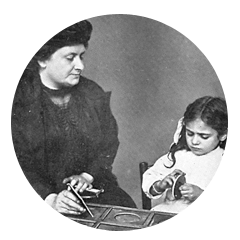
Children learn to write their thoughts and feelings in skillful handwriting. They can develop the ability to write in different styles and about various subjects. They can have the ability to read flawlessly and have a sense of home language at a level where they can be masters of their words. Children are presented new concepts following the art of verbal storytelling, poetry, stories and story books and day-to-day speeches. All these activities allow children to clearly see how new concepts are applied within context across various stages of the curriculum.
A child who looks at, recognizes, and touches the letters as if he were writing is prepared at one and the same time for reading and writing.
Dr. Maria Montessori The Discovery of the Child
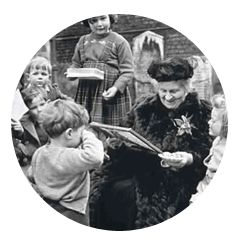
Language exercises contain vocabulary enrichment, language training, alphabet association, letter sound, word building and word composition, expressive writing and reading and comprehension. The most important preparation of the environment of a child's successful written and spoken language development depends on the environment of the home. Parents need to speak clearly and precisely to the child as the first six years of language caregivers will be majorly in the form of spoken language of the child. Reading aloud to the child allows the message and concept and pronunciation of vocabulary be understood and absorbed properly.


